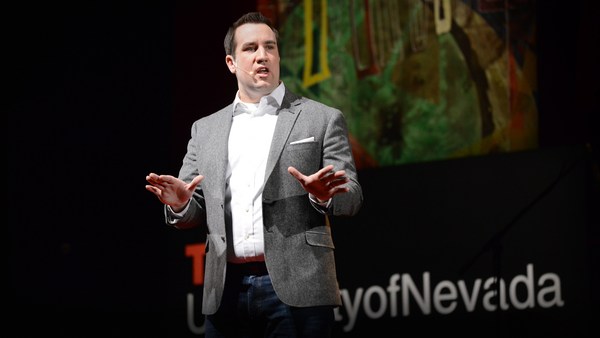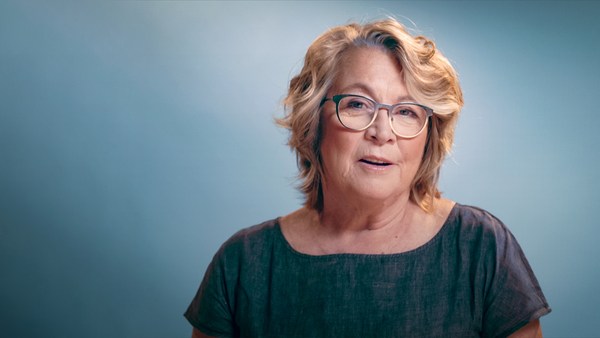No one will ever pay you what you're worth. No one will ever pay you what you're worth. They'll only ever pay you what they think you're worth. And you control their thinking, not like this, although that would be cool.
(Laughter)
That would be really cool. Instead, like this: clearly defining and communicating your value are essential to being paid well for your excellence.
Anyone here want to be paid well? OK, good, then this talk is for everyone. It's got universal applicability. It's true if you're a business owner, if you're an employee, if you're a job seeker. It's true if you're a man or a woman.
Now, I approach this today through the lens of the woman business owner, because in my work I've observed that women underprice more so than men. The gender wage gap is a well-traveled narrative in this country. According to the Bureau of Labor Statistics, a woman employee earns just 83 cents for every dollar a man earns. What may surprise you is that this trend continues even into the entrepreneurial sphere. A woman business owner earns just 80 cents for every dollar a man earns. In my work, I've often heard women express that they're uncomfortable communicating their value, especially early on in business ownership. They say things like, "I don't like to toot my own horn." "I'd rather let the work speak for itself." "I don't like to sing my own praises."
I hear very different narratives in working with male business owners, and I think this difference is costing women 20 cents on the dollar.
I'd like to tell you the story of a consulting firm that helps their clients dramatically improve their profitability. That company is my company. After my first year in business, I saw the profit increases that my clients were realizing in working with me, and I realized that I needed to reevaluate my pricing. I was really underpriced relative to the value I was delivering. It's hard for me to admit to you, because I'm a pricing consultant.
(Laughter)
It's what I do. I help companies price for value. But nonetheless, it's what I saw, and so I sat down to evaluate my pricing, evaluate my value, and I did that by asking key value questions. What are my clients' needs and how do I meet them? What is my unique skill set that makes me better qualified to serve my clients? What do I do that no one else does? What problems do I solve for clients? What value do I add? I answered these questions and defined the value that my clients get from working with me, calculated their return on investment, and what I saw was that I needed to double my price, double it. Now, I confess to you, this terrified me. I'm supposed to be the expert in this, but I'm not cured. I knew the value was there. I was convinced the value was there, and I was still scared out of my wits. What if nobody would pay me that? What if clients said, "That's ridiculous. You're ridiculous."
Was I really worth that? Not my work, mind you, but me. Was I worth that? I'm the mother of two beautiful little girls who depend upon me. I'm a single mom. What if my business fails? What if I fail?
But I know how to take my own medicine, the medicine that I prescribe to my clients. I had done the homework. I knew the value was there. So when prospects came, I prepared the proposals with the new higher pricing and sent them out and communicated the value. How's the story end? Clients continued to hire me and refer me and recommend me, and I'm still here. And I share this story because doubts and fears are natural and normal. But they don't define our value, and they shouldn't limit our earning potential.
I'd like to share another story, about a woman who learned to communicate her value and found her own voice. She runs a successful web development company and employs several people. When she first started her firm and for several years thereafter, she would say, "I have a little web design company." She'd actually use those words with clients. "I have a little web design company." In this and in many other small ways, she was diminishing her company in the eyes of prospects and clients, and diminishing herself. It was really impacting her ability to earn what she was worth. I believe her language and her style communicated that she didn't believe she had much value to offer. In her own words, she was practically giving her services away. And so she began her journey to take responsibility for communicating value to clients and changing her message.
One thing I shared with her is that it's so important to find your own voice, a voice that's authentic and true to you. Don't try to channel your sister-in-law just because she's a great salesperson or your neighbor who tells a great joke if that's not who you are. Give up this notion that it's tooting your own horn. Make it about the other party. Focus on serving and adding value, and it won't feel like bragging. What do you love about what you do? What excites you about the work that you do? If you connect with that, communicating your value will come naturally.
So she embraced her natural style, found her voice and changed her message. For one thing, she stopped calling herself a little web design company. She really found a lot of strength and power in communicating her message. She's now charging three times as much for web design, and her business is growing. She told me about a recent meeting with a gruff and sometimes difficult client who had called a meeting questioning progress on search engine optimization. She said in the old days, that would have been a really intimidating meeting for her, but her mindset was different. She said, she prepared the information, sat down with the client, said this isn't about me, it's not personal, it's about the client. She took them through the data, through the numbers, laid out the trends and the progress in her own voice and in her own way, but very directly said, "Here's what we've done for you." The client sat up and took notice, and said, "OK, I got it." And she said in describing that meeting, "I didn't feel scared or panicky or small, which is how I used to feel. Instead I feel like, 'OK, I got this. I know what I'm doing. I'm confident.'"
Being properly valued is so important. You can hear in this story that the implications range far beyond just finances into the realm of self-respect and self-confidence. Today I've told two stories, one about defining our value and the other about communicating our value, and these are the two elements to realizing our full earning potential. That's the equation. And if you're sitting in the audience today and you're not being paid what you're worth, I'd like to welcome you into this equation. Just imagine what life could be like, how much more we could do, how much more we could give back, how much more we could plan for the future, how validated and respected we would feel if we could earn our full potential, realize our full value.
No one will ever pay you what you're worth. They'll only ever pay you what they think you're worth, and you control their thinking.
Thank you.
(Applause)





